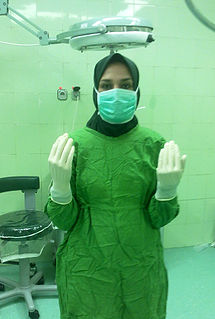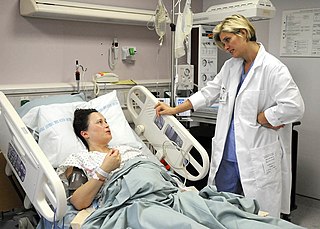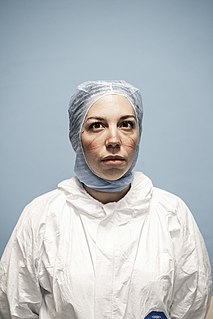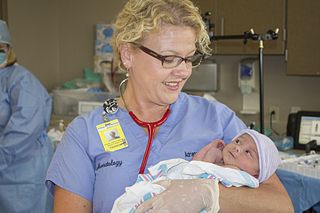Related Research Articles

A surgical technologist, also called a scrub, scrub tech, surgical technician, or operating room technician, is an allied health professional working as a part of the team delivering surgical care. Surgical technologists are members of the surgical team. The members of the team include the surgeon, surgeon's assistant, circulator nurse and anesthesia provider. They possess knowledge and skills in sterile and aseptic techniques. There are few mandatory professional requirements for surgical technologists, and the scope of practice varies widely across countries and jurisdictions. Surgical technologists attend junior colleges and technical schools, and many are trained in military schools. In the military they perform the duties of both the circulator and the scrub. The goal is for surgical technologists to be able to anticipate the next move the surgeon is going to make in order to make the procedure as smooth and efficient as possible. They do this by having knowledge of hundreds of surgical procedures and the steps the surgeon needs to take in order to complete the procedure, including the very wide range of surgical instruments they may need. Specialties can include, but are not limited to, the following: genitourinary, obstetrics and gynaecology, urology, ENT, plastics, general, orthopedics, neurology, and cardiovascular. They only work in surgical or perioperative areas and are highly specialized.
Cardiac nursing is a nursing specialty that works with patients who suffer from various conditions of the cardiovascular system. Cardiac nurses help treat conditions such as unstable angina, cardiomyopathy, coronary artery disease, congestive heart failure, myocardial infarction and cardiac dysrhythmia under the direction of a cardiologist.

In the United States, a Certified Nurse-Midwife (CNM) is a nurse midwife who exceeds the International Confederation of Midwives essential competencies for a midwife and is also an advanced practice registered nurse, having completed registered nursing and midwifery education leading to practice as a nurse midwife and credentialing as a Certified Nurse-Midwife. CNMs provide care of women across their lifespan, including pregnancy and the postpartum period, and well woman care and birth control. Certified Nurse-Midwives are exceptionally recognized by the International Confederation of Midwives as a type of midwife in the U.S.
Nursing credentials and certifications are the various credentials and certifications that a person must have to practice nursing legally. Nurses' postnominal letters reflect their credentials—that is, their achievements in nursing education, licensure, certification, and fellowship. The letters usually appear in the following order:

Critical care nursing is the field of nursing with a focus on the utmost care of the critically ill or unstable patients following extensive injury, surgery or life threatening diseases. Critical care nurses can be found working in a wide variety of environments and specialties, such as general intensive care units, medical intensive care units, surgical intensive care units, trauma intensive care units, coronary care units, cardiothoracic intensive care units, burns unit, paediatrics and some trauma center emergency departments. These specialists generally take care of critically ill patients who require mechanical ventilation by way of endotracheal intubation and/or titratable vasoactive intravenous medications.

Gerontological nursing is the specialty of nursing pertaining to older adults. Gerontological nurses work in collaboration with older adults, their families, and communities to support healthy aging, maximum functioning, and quality of life. The term gerontological nursing, which replaced the term geriatric nursing in the 1970s, is seen as being more consistent with the specialty's broader focus on health and wellness, in addition to illness.
In the United States, anesthesia can be administered by physician anesthesiologists, an anesthesiologist assistant, or nurse anesthetist.
The American Nurses Credentialing Center (ANCC), a subsidiary of the American Nurses Association (ANA), is a certification body for nursing board certification and the largest certification body for advanced practice registered nurses in the United States, as of 2011 certifying over 75,000 APRNs, including nurse practitioners and clinical nurse specialists.

A family nurse practitioner (FNP) provides continuing and comprehensive healthcare for the individual and family across all ages, genders, diseases, and body systems. Primary care emphasizes the holistic nature of health and it is based on knowledge of the patient in the context of the family and the community, emphasizing disease prevention and health promotion.
Medical-surgical nurses must meet certain eligibility requirements and pass an exam to gain certification as a Certified Medical-Surgical Registered Nurse. The exam currently takes three hours and it has 150 multiple choice questions
The National Healthcareer Association (NHA) is a national professional certification agency for healthcare workers in the United States. Granting credentials in more than 8 allied health specialties, it is an organizational member of the National Organization for Competency Assurance (NOCA). The National Healthcareer Association partners with educational institutions nationwide with over 350,000 certified individuals. It is one of the largest certification and continuing education providers. The National Healthcareer Association works with health training institutions, hospitals, unions, and the US Defense Department through DANTES; it has approved over 2400 training/testing locations throughout the US and in several countries. These institutions offer allied health programs and use the national certification as their "End Of Program Credential." Healthcare professional certification is different from a license such as a Registered Nurse, or a licensed practical nurse. Although certification is not state mandated and/or regulated in all 50 states, most employers and industry organizations prefer their employees to be certified.
Margretta (Gretta) Madden Styles, EdD, RN, FAAN was an American nurse, author, educator and nursing school dean who conceived and helped establish national standards for certifying nurses in pediatrics, cardiology and other medical specialties. Dr. Styles was the president of the American Nurses Association from 1986 to 1988, and wrote five books and many articles published in medical journals.

Nurses in Canada practise in a wide variety of settings, with various levels of training and experience. They provide evidence-based care and educate their patients about health and disease.

Paraveterinary worker is the professional of veterinary science that performs procedures autonomously or semi autonomously, as part of a veterinary assistance system. The job role varies throughout the world, and common titles include veterinary nurse, veterinary technician and veterinary assistant, and variants with the prefix of 'animal health'.

A neonatal nurse practitioner (NNP) is an advanced practice registered nurse (APRN) with at least 2 years experience as a bedside registered nurse in a level III NICU, who is prepared to practice across the continuum, providing primary, acute, chronic, and critical care to neonates, infants, and toddlers through age 2. Primarily working in neonatal intensive care unit (NICU) settings, NNPs select and perform clinically indicated advanced diagnostic and therapeutic invasive procedures. In the United States, a board certified neonatal nurse practitioner (NNP-BC) is an APRN who has acquired Graduate education at the master’s or doctoral level and has a board certification in neonatology. The National Association of Neonatal Nurse Practitioners (NANNP) is the national association that represents neonatal nurse practitioners in the United States. Certification is governed by the National Certification Corporation for Obstetrics, Gynecologic and Neonatal Nursing Specialties (NCC).
An adult-gerontology nurse practitioner (AGNP) is a nurse practitioner that specializes in continuing and comprehensive healthcare for adults across the lifespan from adolescence to old age.
Advanced practice registered nurses (APRNs) are registered nurses with graduate degrees in nursing. APRN roles include: certified nurse midwife, clinical nurse specialist, certified registered nurse anesthetist, and nurse practitioner. APRNs assess, diagnose, manage patient medical problems, order diagnostic tests, and prescribe medications. Rules, regulations, and credentialing for APRNs vary by state. This page outlines the regulatory processes for nurse practitioners in Wisconsin, including education, certification, licensing, and credentialing. Regulatory and credentialing processes are continuously changing, and the information contained on this page is current as of November 2015.
An acute care nurse practitioner (ACNP) is a registered nurse who has completed an accredited graduate-level educational program that prepares them as a nurse practitioner. This program includes supervised clinical practice to acquire advanced knowledge, skills, and abilities. This education and training qualifies them to independently: (1) perform comprehensive health assessments; (2) order and interpret the full spectrum of diagnostic tests and procedures; (3) use a differential diagnosis to reach a medical diagnosis; and (4) order, provide, and evaluate the outcomes of interventions. The purpose of the ACNP is to provide advanced nursing care across the continuum of health care services to meet the specialized physiologic and psychological needs of patients with acute, critical, and/or complex chronic health conditions. This care is continuous and comprehensive and may be provided in any setting where the patient may be found. The ACNP is a licensed independent practitioner and may autonomously provide care. Whenever appropriate, the ACNP considers formal consultation and/or collaboration involving patients, caregivers, nurses, physicians, and other members of the interprofessional team.

A nurse midwife is both a nurse and a midwife, having completed nursing and midwifery education leading to practice as a nurse midwife and sometimes credentialed in the specialty. Nurse midwives provide care of women across the lifespan, including during pregnancy and the postpartum period, and well woman care and birth control.
References
- ↑ Academy of Medical-Surgical Nurses (AMSN)
- ↑ The Nursing Spectrum (Nursing Spectrum magazine)
- ↑ "American Nurses Credentialing Center". Archived from the original on 2018-01-22. Retrieved 2011-03-01.

